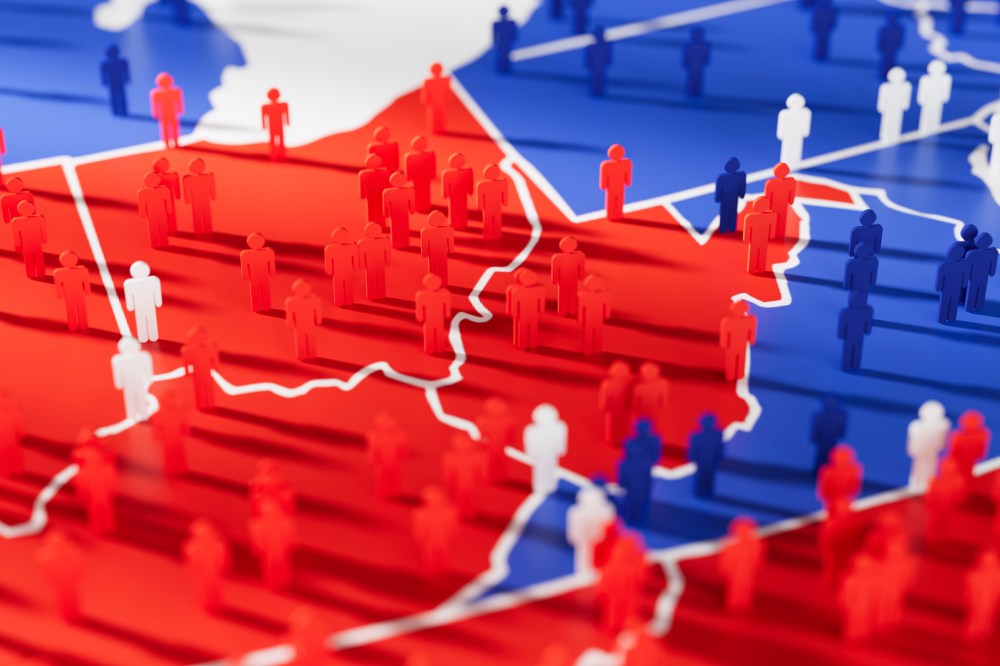Dear Reader (especially those of you following the election that really matters),
I had a whole other G-File mostly done, but then I kept seeing all sorts of asinine and pernicious stuff that I felt compelled to respond to. So we’ll put off that one for another time.
I completely understand why some folks are so upset about Donald Trump winning. But that’s really no reason to trash-talk democracy, America, or the Americans who democratically voted for Trump. I am not backsliding or changing course here; I still think Trump is unfit for office. That doesn’t mean, though, that everyone who voted for the guy is a fascist, sexist, racist, or idiot.
There are many reasons this kind of talk is objectionable and ill-advised, but I’m going to focus on the one that matters the most: It’s not true.
Let’s start with the claim that everyone who voted for Trump is an idiot.
Did some idiots vote for Trump? Of course. But I guarantee you that Harris got her share of the idiot vote, too. Idiots are pretty well distributed across the political spectrum. And you know what? So are smart people. Lots of smart people voted for Trump. And lots of smart people voted for Harris. I find the tendency of people—smart and dumb ones alike—to think that “smart” and “right” and “dumb” and “wrong” are interchangeable terms to be one of the most exhausting analytical errors out there.
In fact, it’s almost as exhausting as thinking that “wrong” is synonymous with “fascist” or “bigot.” Fascism and bigotry are wrong, but not all wrong people are fascists and bigots. Are some Trump voters fascists and bigots? Yeah, sure. But I don’t think he cornered that market either.
More importantly, for every voter who wants Trump to be a “fascist”—or racist, or authoritarian, etc. the labels here really don’t matter—there are probably dozens, or hundreds, or, most likely, tens of thousands of Trump voters who think it’s unfair to call him an authoritarian, never mind a fascist. Why? Because they don’t think he is one and don’t want him to be one. Those people might be wrong (I have opinions!), but that doesn’t mean they’re idiots or fascists themselves. It just means they’re wrong. And convincing them they’re wrong doesn’t get easier by calling them idiots and fascists.
And that, in a nutshell, is the grave error people are making. People vote for candidates—any candidate—for lots of different reasons. If you think Trump is a fascist, fine. We can talk about that. But just because you think he’s a fascist doesn’t mean someone who voted for him agrees with you and voted for him anyway. I know dozens of people who voted for Trump. None of them are idiots or fascists or fascist idiots.
This argument works every bit as much in the other direction. You may think Kamala Harris is a “communist” or “Marxist,” etc. Whether she is or not is a debatable proposition in the sense that it can be debated. But if you want people to agree with you, you need to make the argument, not just hurl the accusation. If you’re sure she is a communist, no one can deny you the right to say so—but saying so doesn’t mean everyone has to agree with you. Very few of the 68 million people who voted for Harris did so because they thought she was a Marxist or a communist.
For argument’s sake, let’s say Trump is a fascist. But let’s also imagine that we didn’t have inflation, that the economy was roaring, that Biden hadn’t governed from the left, and that Harris was a much better candidate. The fascists out there would have still voted for Trump, but millions upon millions of other people who did vote for Trump this week probably wouldn’t have. Assuming that all Americans share precisely your understanding of Trump—or any candidate—and voted for him anyway is just wrong, factually and, I would say, morally. Saying that a Latino mechanic in Philly who voted for Trump magically became a fascist the moment he filled the oval for someone you think is a fascist is magical thinking. And if you’re a Democrat who wants to win back that mechanic in 2028, calling him a fascist isn’t going to get you very far. Persuading him that he was wrong is a much more fruitful avenue.
Or look at it this way. Lots of liberals are telling themselves that Harris lost because she’s a black woman. There may be some truth to this at the margins, but we can’t rerun the experiment with a white male liberal candidate. Moreover, sometimes voters do things for subconscious reasons. The taller candidate usually wins, but very few voters consciously make their decision based on height.
Regardless, it’s not true that everyone who voted against Harris (or Hillary Clinton in 2016) did so for sexist reasons. Just because you think that her race or gender was a compelling reason to vote for her doesn’t mean that everyone who voted against her did so for the opposite reason. If Nikki Haley had run this year, most Democrats would have voted against her and most Republicans would have voted for her. That wouldn’t have suddenly meant that the Democrats were sexist or bigoted against Indian-Americans. Monocausal thinking makes idiots of geniuses and morons alike.
This is why I’ve been carping about how much I hate the whole “who are you going to vote for?!” drumbeats. Everything you believe can’t be summed up in a vote. Voting isn’t magic and it’s not window into the soul either. But a lot of people have a magical view of voting. They also have a magical view of the presidency. The way countless people—again, idiots and geniuses alike—talk about the presidency often takes the form of premodern idolatry. A strong king means we will have good crops! A strong president means we will have a strong economy. The economy in Trump’s first term was good—it wasn’t as fantastic as many claim—but it was good, and Trump’s policies had something to do with it. But so did a lot of other things. If you think Trump single-handedly ran the economy you have a flimsy understanding of how a $27 trillion economy works. And if you think that simply by virtue of being president again, we’ll get the same economy again, you’re in for some surprises. I’m not saying Trump will tank the economy, though that’s certainly possible. All I’m saying is that things are different now and no president has the power to simply will the economy he wants into existence.
If, as bond markets seem to think, inflation surges under Trump, it would be ridiculous to say that the people who voted for him to fight inflation really voted for higher inflation. The same goes for countless other things that will happen over the next four years. The people who voted for him to protect democracy or defend the Constitution will be angry if he undermines either. That won’t be proof that Trump voters hate democracy; it will be proof that they were wrong about Trump.
Trump’s superfans are making the same mistake Trump’s super-foes make. The people who insist that Trump has a sweeping mandate to be and do whatever he wants will be in for a shock if—when—he follows that advice. If he imposes massive across-the-board tariffs and we get a huge spike in consumer prices, layoffs, and supply chain debacles, millions of people will say “this isn’t what I voted for” in the same way millions of people said the same thing when Biden screwed up withdrawing from Afghanistan or got shellacked by inflation. If Trump drags 10-15 million people into detention centers before shipping them off in cattle cars and cargo ships, a lot of the people who voted for him will walk away from him. And others will cheer. Elections are snapshots of popular sentiment at a given moment in time, and they happen on a schedule. Politics, on the other hand, happens 24-7.
But one of the weirdest delusions in American politics is the assumption that electorates become a kind of identity group once the returns come in. They think that if you voted for a candidate once, you belong to that candidate for all time. That’s not how it works. If it worked that way, presidential approval ratings would never change.
Presidential electorates are like a pop-up event. People show up at a specific time, make a choice for various reasons, and then they disperse. People who see a movie on opening day have one thing in common: They all saw the movie on opening day. Some liked it. Some hated it. But the point is, once they leave the theater, they go on about their different lives. They aren’t a meaningful bloc of Americans with locked-in views and attitudes, even about the movie they just saw. Electorates are a more meaningful group than people who see a Transformers movie on opening day, but they aren’t a hardwired identity either.
There are people who voted for Trump believing that he was lying about some things just to get elected. There are other people who voted for him believing that he was telling the truth about that stuff but definitely lying about other stuff. Now that he’ll be president, we’ll find out which things were lies and which weren’t. If he pardons all of the January 6 rioters, some people who voted for him will be very happy, others will be disgusted, and many others will fall somewhere in between. If he puts RFK Jr. in charge of health care, some will be horrified, some will be happy, and others just won’t care—at least not until their kids start getting measles. We’ll just have to wait and see.
But treating fellow Americans like they are “enemies within” is wrong and destructive when Donald Trump does it. And it’s wrong and destructive when his enemies do it. Wait for the facts. Have arguments over the facts. That’s what politics and democracy are for, no matter who wins an election. And if you win the argument, you’ll win the next election.
I have one last point to make: Don’t act like your vote is an oath of loyalty.
If you don’t like what Trump does, don’t be afraid to say so. If you do like what Trump does, don’t be afraid to say so. This goes for everybody, but especially for people in my line of work. If you believe something to be true, you should believe it until proven otherwise. Don’t outsource your intellect, your principles, or conscience to one man or one party. When you do that, you are making your partisan identity your actual identity. This goes equally for the people who love Trump—or simply love how much his enemies hate him—as it goes for people who hate Trump. It’s fine to root for his success or failure, but not at the expense of the more permanent things you believe. And certainly not at the expense of your country or democracy.
Various & Sundry
Canine Update: The girls did not like me being gone in NYC for CNN stuff. But they persevered. They also didn’t like the unseasonably warm weather. They have very strong feelings about the Fall. Zoë’s been really chummy with Rusty lately. The other day they went off for a mysteriously long time and returned with especially pungent breath. Best not to ask more questions. And this afternoon, they cleared the deer out of sector 7G. Just because the canine division of labor assigns different responsibilities to Pippa does not mean she’s been any less diligent. She has been doing some excellent retrieving, and she’s making sure that the load-bearing wall on the stairs remains upright. Gracie continues to set her own schedule and make demands. Oh, and Fafoon still finds you wanting.
Last chance for half-baked ideas. On Monday I’m recording a Remnant with Mike Gallagher for our periodic half-baked ideas podcast. If you have suggestions please send my way (theremnantpod@gmail.com). I’m not sure I can get to all of them, but I’ll try. Please designate if you want me to read your name or not.
The Dispawtch

Owner’s Name: Kristy Mascarenhas
Why I’m a Dispatch Member: I’ve never belonged to a political party, and The Dispatch was the first place in a long time that I could park my political beliefs, learn something new just about every day, and mostly maintain my sanity. The whole family looks forward to the Friday G-File (although the kiddo and the dogs mainly stick to The Adventures of Zoe and Pippa, and the dogs are amazed that squirrels are actually catchable). The podcasts are my companions during late-night paperwork and crafting sessions.
Personal Details: I grew up in a small town without party politics, but we were taught civics (well!) and a real appreciation and love for the United States. Being the daughter of an immigrant and the wife of an immigrant probably magnified that appreciation even more. We’re trying to make sure our son grows up knowing that even with all its flaws, we live in a very special place—and we try to help it reach its potential.
Pet’s Name: Sadie (big hairy one) and Nutmeg (little one).
Pet’s Breed: Mutts (rescues).
Pet’s Age: Sadies is 3, Nutmeg is 9 months.
Gotcha Story: Sadie came along as a pup a few months after we lost our first dog, Chewy, to honorable old age during the pandemic. The house was too empty and hairless, and we saw a picture of a sweet, innocent fluffball on the rescue website and decided we needed each other. After several years of Sadie shouting PLAY WITH ME? at every human and dog on our block, we went to our rescue’s annual “rescue reunion” and neglected to promise beforehand that we weren’t bringing home any more dogs. Our kiddo fell in love with every adoptable pup at the reunion, and Nutmeg returned the favor especially enthusiastically. So now Sadie has a little brother who steals her bed, her toys, and her food. But he never turns down an invitation to play—and he has as much energy as she does.
Pet’s Likes: Sadie likes: People! Dogs! Drinking from the garden hose. Watching “squirrel TV” (going in her crate and looking at them out the glass door). Chasing them is even better. Chewing Legos. Chewing paper towels. Nutmeg likes: People! Food! Playing with Sadie. Chewing her bed. Chewing our bed. Chewing our shoes. Chewing our clothes. Chewing our socks. Oh, and squirrels are fun too.
Pet’s Dislikes: Sadie doesn’t like squirrels. It’s terribly unfair that you can’t just chase the little beasts right up the trees. She also doesn’t like toys that move on their own. They shouldn’t be allowed. Nutmeg dislikes the vacuum.
Pet’s Proudest Moment: Sadie likes to greet our visitors at the door with a toy in her mouth. If you don’t pet her, she’ll bring you another … and another … until you pay attention to her, on the theory that it must just be the wrong toy for you. The day she got my non-dog-loving mother to pet her was a very proud moment indeed. Nutmeg made it up the stairs all by himself on his very first night in our house. (The puppy belly did get in the way a bit!)
Moment Someone (Wrongly) Said Pet Was a Bad Dog: For both of them, it was chewing non-food items. Sadie shredded an entire roll of toilet paper and we found her sitting innocently among the (remaining) evidence. This was, thankfully, past the toilet paper shortage stage of the pandemic. Nutmeg chewed several inches off the hem of my husband’s pants overnight, and he got dressed in the dark and went off to work unaware he looked like Fred Flintstone until full daylight. Yup, we called them bad doggies while trying not to laugh … but they were puppies … and one, at least, has mostly grown out of it!
Do you have a quadruped you’d like to nominate for Dispawtcher of the Week and catapult to stardom? Let us know about your pet by clicking here. Reminder: You must be a Dispatch member to participate.







Please note that we at The Dispatch hold ourselves, our work, and our commenters to a higher standard than other places on the internet. We welcome comments that foster genuine debate or discussion—including comments critical of us or our work—but responses that include ad hominem attacks on fellow Dispatch members or are intended to stoke fear and anger may be moderated.
With your membership, you only have the ability to comment on The Morning Dispatch articles. Consider upgrading to join the conversation everywhere.